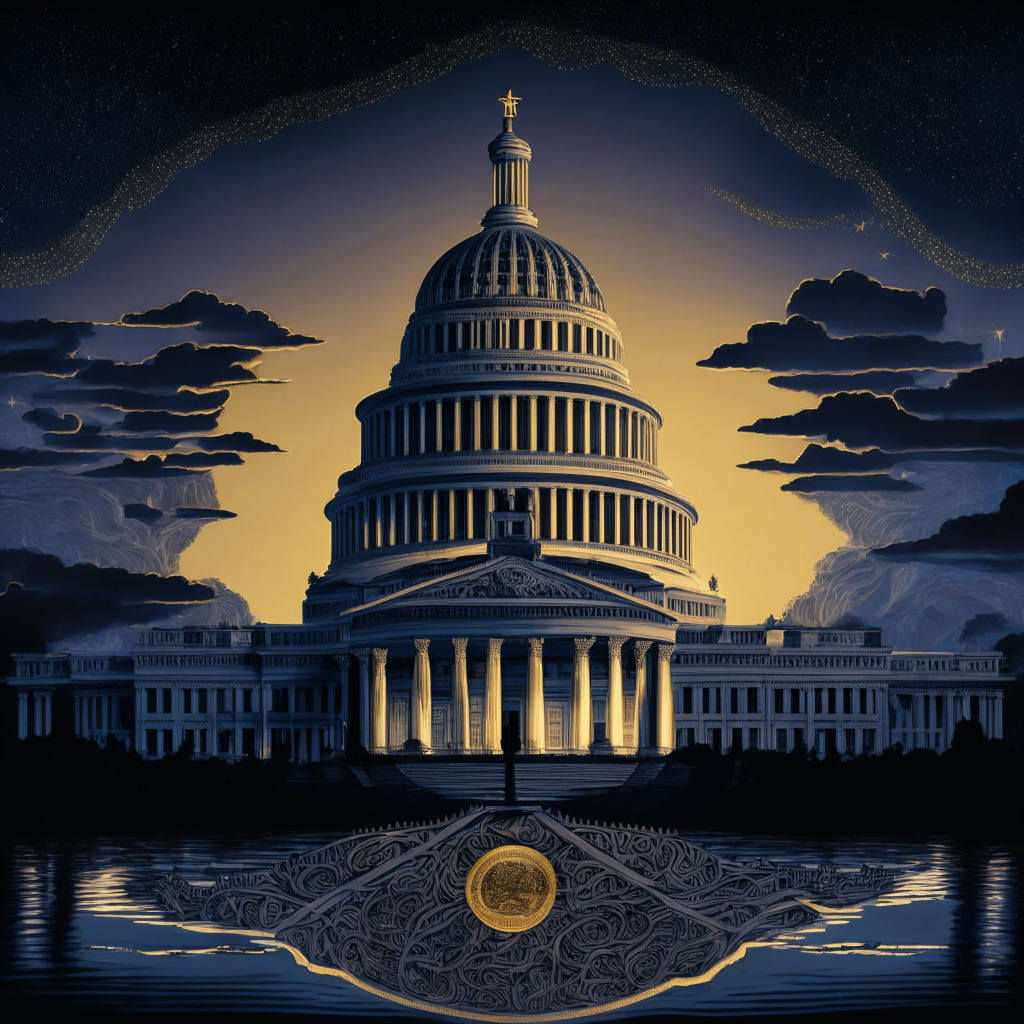The U.S Treasury’s Office of Foreign Assets Control (OFAC) has targeted several cryptocurrency wallets involved in the illicit trade of fentanyl. Most transactions were conducted via Stablecoins on Ethereum and Tron networks. These wallets, save for one, were hosted on a centralized crypto exchange, allowing the illicit flow of hundreds of thousands of dollars worth of cryptocurrency.
Search Results for: Elizabeth Tan
Unmasking the Paradox: Coinbase’s ‘Stand with Crypto Alliance’ and the Ethics Dilemma
“Cryptocurrency giant Coinbase recently launched the ‘Stand with Crypto Alliance,’ aimed at fostering dialogue between crypto holders and lawmakers. Despite featuring controversial figures, the initiative has made significant strides with over 54,000 individuals signing on. This move signals a potential shift in the crypto industry’s direction.”
Winklevoss Warns Democratic Crypto Stance Could Cost Youth Vote and Elections
Crypto billionaire Cameron Winklevoss warns that Senator Elizabeth Warren and SEC Chairman Gary Gensler’s pushback against crypto may alienate potential Democratic supporters, particularly Millennials and Gen Z voters. As younger generations increasingly embrace crypto’s potential applications and investments, the growing regulatory scrutiny could negatively impact their affinity towards the Democratic party.
Crypto Wars: Democrats Risk Alienating Youth Voters with Anti-Crypto Stance
Crypto billionaire Cameron Winklevoss warns that the war on cryptocurrencies led by U.S. Senator Elizabeth Warren and SEC Head Gary Gensler could alienate Millennials and Gen Z, potentially impacting Democratic voter support. Not all Democrats share anti-crypto sentiment, as the debate around regulations continues to shape the political landscape.
Binance Investigation Request: Truth, Misunderstanding, and the Crypto Industry’s Integrity
Senators Elizabeth Warren and Chris Van Hollen have requested an investigation into Binance for potentially lying to Congress about its relationship with Binance.US. The exchange faces accusations of secretly controlling Binance.US and misleading investors, raising questions about its compliance with regulations and the necessity for transparent communication in the crypto industry.
Elizabeth Warren’s Crypto Crackdown: Protecting vs Stifling the Industry
US Senator Elizabeth Warren plans to introduce a bill closing cryptocurrency loopholes, asserting crypto payments fuel the Chinese fentanyl trade. The controversial stance sparks mixed reactions and divides political leaders, while raising questions on the future of the cryptocurrency industry amid regulatory scrutiny.
Cryptocurrency and Fentanyl Crisis: Senator Warren’s Regulatory Push Amid Alarming Stats
Sen. Elizabeth Warren calls out cryptocurrency’s role in fentanyl drug transactions, highlighting her Digital Asset Anti-Money Laundering Act. Cryptocurrency enabled 90 Chinese suppliers to exchange precursor drugs, producing $54 billion worth of fentanyl pills, causing concerns over crypto’s potential to facilitate illegal activities.
Cryptocurrencies, Fentanyl, and China: Balancing Regulation and Innovation
Senator Elizabeth Warren highlighted a connection between cryptocurrency payments and China-based firms supplying fentanyl precursors, raising concerns on the need for effective cryptocurrency regulations. Critics argue that imposing more regulations might hinder the growth and innovation of blockchain technology. Senator Warren plans to reintroduce legislation addressing the regulatory gaps related to illicit cryptocurrency use while safeguarding potential innovations in finance.
Cryptocurrency, Fentanyl Trade, and Balancing Regulation: An In-Depth Analysis
Senator Elizabeth Warren highlights the connection between cryptocurrency and the Chinese fentanyl trade, proposing the Digital Asset Anti-Money Laundering Act to halt such transactions. Striking a balance between security and innovation is crucial in regulating the blockchain and digital asset sector.
DeSantis’ Crypto-Friendly Stance: A Beacon for Blockchain Innovation in 2024 Election
Ron DeSantis’ presidential campaign announcement highlights his pro-crypto stance, emphasizing personal freedom and economic sovereignty. As he criticizes centralized digital currencies, DeSantis positions himself as an influential crypto-friendly figure in contrast to the Biden administration’s regulatory approach. The crypto community seeks leaders like DeSantis, who understand cryptocurrency’s complexities and potential.
Unlocking Climate Change Battle Chests: Can Web3 Bridge the Funding Gap?
“Web3 holds the potential to revolutionize climate finance management, shifting control from governments to individuals, and tapping into $8.2 trillion in untapped retail investor wealth. This transition, despite its challenges like tokenization of climate assets and creating decentralized autonomous organizations (DAOs), could bridge the climate funding gap and pave the path towards the goal of $1 trillion in annual climate financing.”
Crypto Wallet Sanctions: A Necessary Countermeasure or a Threat to Blockchain Progress?
“US authorities sanctioned a series of crypto wallets connected to fentanyl manufacturing, casting a sceptical light on the blockchain sphere. These developments spotlight identity concealment and transaction monitoring issues on blockchain platforms. Balancing the issue, blockchain’s global scalability brings potential for a more democratised financial future, requiring robust regulations and security measures.”
Bipartisan Battle for Crypto: A Deep Dive into U.S. Digital Asset Regulation
Senators Kirsten Gillibrand and Cynthia Lummis have introduced a new crypto bill, the Responsible Financial Innovation Act, aimed at addressing regulatory ambiguity in the US cryptocurrency industry. This legislation could shift the oversight of most digital assets from SEC to the Commodity Futures Trading Commission.
CoinShares Boldly Enters US Market despite Regulatory Tumult: A Risky Gamble or Calculated Maneuver?
CoinShares, a popular crypto asset manager, is expanding its market to the US, focusing on cryptocurrency investors with private investment products. Despite possible legal and regulatory challenges, CoinShares is optimistic about navigating the US crypto climate. Its new venture offers a hedge against interest rate-driven volatility in the crypto market.
Binance’s Plan to Delist Stablecoins in Europe: A Critical Look at Regulatory Compliance and Market Impact
“Binance, a key cryptocurrency exchange, plans to delist all stablecoins for the European market by June 2024, in adherence to the Markets in Crypto Assets (MiCA) law. This move, expected to impact significantly on Europe’s market, reflects the potential disruptions regulatory changes can cause. Meanwhile, the U.S. resists implementing a Central Bank Digital Currency (CBDC), despite other countries’ pursuits of national digital currency.”
Bankrupt Celsius To Undergo Leadership Change: A Ray of Hope or A Path to Uncertainty?
Former Algorand CEO, Steve Kokinos, is set to take over the bankrupt crypto lender, Celsius, under an unnamed Delaware corporation, following Celsius’ bankruptcy filing during a 2022 crypto market crash. The transition could lead to partial recovery of stakeholders’ assets, creating an uncertain future for Celsius amidst a former CEO’s fraud charges and an upcoming approval vote.
Advocacy Group Coin Center Pushes for More Refined Crypto Tax Policies
Crypto policy experts at Coin Center are advocating for a better tax policy for digital assets. They propose a nominal exemption for small crypto transactions, no tax on block rewards until sold, and simpler methods for determining cryptocurrency donation amounts. They also emphasize the need for tax policy clarity for third-party non-custodial intermediaries in digital asset transactions.
Bipartisan Crypto Support: Accelerating Adoption or Facing Opposition?
“Cryptocurrency finds itself adopted by parties on both sides of Washington’s political divide, evolving from being a niche technology to a politically intriguing topic. Coincidentally, support seems almost equal, with 26 Republicans and 22 Democrats in the House, and 24 Republicans and 11 Democrats in the Senate advocating for crypto. Criticism exists too, demanding more transparency and protection of traditional institutions.”
Shifting Political Winds: Potential Impact on US Crypto Regulatory Landscape Post 2024 Election
Recent comments from former SEC official John Reed Stark suggest potential changes to U.S. crypto regulation influenced by party politics. Stark attributes a pro-crypto regulation shift to a possible Republican win in 2024, ending current SEC chair Gensler’s tenure, and potentially paving the way for Hester Peirce, known for her softer stance on crypto.
Unleashing Stablecoins: Assessing PayPal’s PYUSD Launch Amid Political Divides and Regulatory Turbulence
“PayPal’s recent launch of its stablecoin, PYUSD, under the regulatory framework of the New York Department of Financial Services has stirred conversations about stablecoin adoption. Unlike Meta’s unsuccessful Libra, PayPal’s project is viewed more favorably politically, indicating an imminent regulatory framework for stablecoins in the U.S.”
Regulation Tug-of-War in Crypto: FTX’s Struggle and a Reassessment of Tax Policy
FTX, a prominent cryptocurrency exchange, faces criticism from creditors over its reorganization plan. Amid regulatory concerns, the exchange is attempting to revitalize its operations, particularly its Dubai unit. Meanwhile, the US Internal Revenue Service mandates that crypto investors must report rewards as part of their gross income, and the Department of Justice considers charging crypto exchange Binance with fraud allegations. These incidents underscore the pressing need for regulatory clarity in the crypto economy to maintain investor trust.
Balancing Blockchain Regulation: Safeguarding Security or Stifling Innovation?
“The blockchain technology space is experiencing scrutiny regarding digital assets regulations due to North Korea’s alleged illicit cryptocurrency activities. Reducing such practices necessitates governmental involvement, but regulations should also foster innovation. The balance between regulation for protection and space for innovation will significantly determine the industry’s future.”
Closing the $50 billion Crypto Tax Gap: Urgent Measures or Rushed Consequences?
Democratic Senators, including Elizabeth Warren and Bernie Sanders, urged the IRS and the Treasury Department to expedite new crypto tax regulations to close a potential “$50 billion crypto tax gap.” They expressed concerns about potential loss of $1.5 billion in government tax revenue for 2024 due to delay in the implementation. This is amid a wider conversation for more transparency in the bourgeoning cryptocurrency sector.
Unmasking Tech Giants: Are Apple’s App Store Policies Stifling Crypto Innovation?
“Recent actions in the technology sector highlight the relationship between tech giants and blockchain and nonfungible tokens (NFTs). A probe into Apple’s App Store policies by US lawmakers aims to analyze if these guidelines indirectly slow technological progress. The lawmakers raise concerns about the impact of Apple’s rules on innovations like distributed ledger technology and NFTs, and potential negative consequences on the US’s status in emerging technology.”
Navigating the New Terrain: Implications of the NDAA Bill on Crypto Privacy and Regulation
The U.S. Senate has passed the National Defense Authorization Act, imposing new regulations on the digital asset world, including privacy coins and crypto mixers. The regulations aim to stem crypto-related fraud and are expected to force an elevation in crypto regulatory standards, obliging authorities to crack down on anonymous crypto transactions. The discourse reflects the conflict between privacy freedoms versus governance needs in the crypto sector.
2024 NDAA and Crypto: Striking Balance between Oversight and Innovation
The United States Senate has passed the 2024 National Defense Authorization Act that targets crypto mixers, crypto trading institutions, and anonymous coins. The bill draws provisions from the Digital Asset Anti-Money Laundering Act and the Responsible Financial Innovation Act for improved oversight on crypto-based activities. Key measures include examination standards for crypto, preventing FTX-style events, and studies to curb anonymous crypto transactions.
U.S. Senate Tightens Crypto Regulations in NDAA 2024: A Necessity or Threat to Blockchain Freedom?
The U.S. Senate’s passage of the 2024 National Defense Authorization Act introduces tighter regulations for financial institutions engaged in crypto trading, marking a significant legislative shift. The bill targets crypto mixers and “anonymity-enhancing” crypto assets and aims to strengthen compliance with money laundering and sanctions laws.
Could Bitcoin Decide the Next President? Exploring Cryptocurrency’s Growing Political Influence
“Bitcoin and the crypto community could be deciding factors in a U.S. presidential election. Candidates now need to proclaim their stance on cryptocurrencies. The U.S. Federal Reserve estimates that 8%-11% of the American population, owning cryptocurrencies, can considerably influence the election. Anti-Bitcoin policies may thus, alienate a rapidly growing cohort of voters.”
Unmasking Blockchain Investigation Tools: Are They Just Art, Not Science?
“The reliability of blockchain investigation toolkits like Chainalysis’ Reactor may not be as dependable as assumed. With questions raised about its scientific evidence of accuracy, its widespread usage – causing possible unjust account restrictions and unwarranted legal scrutiny – is concerning.”
Navigating the Metaverse: XR Technology and the Threat to Personal Privacy
“Advanced technologies such as emotion detection, affect recognition, neurotechnologies, and XR increasingly threaten personal privacy by delving into previously inaccessible layers of our existence. These technologies digitize multiple aspects of our lives, raising data protection concerns that impact not only individuals, but also groups and society overall.”
Exploring the Impact of the Responsible Financial Innovation Act on Cryptocurrency Future
US Senators Cynthia Lummis and Kirsten Gillibrand plan to reintroduce the Responsible Financial Innovation Act, a regulatory bill for digital assets. The legislation aims to define the SEC and CFTC roles in regulating digital assets and enhance consumer protection, potentially safeguarding against future market crashes. However, there are fears that this could suppress innovation in the sector.
Unlocking AI Potential with Bitcoin Transactions: A Leap Towards the Future or a Risky Move?
“Lightning Labs is creating innovative tools that enable AI applications to manage Bitcoin transactions. Transitioning from traditional payment methods, the proprietary tools combine high-frequency Bitcoin micropayments with popular AI software libraries. This new approach reduces costs and broadens AI software access, paving the way for unprecedented AI applications.”






























